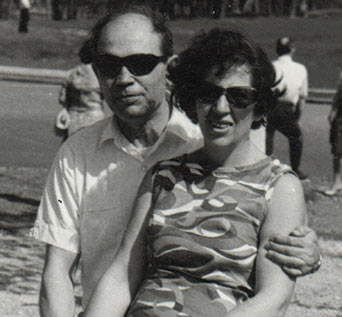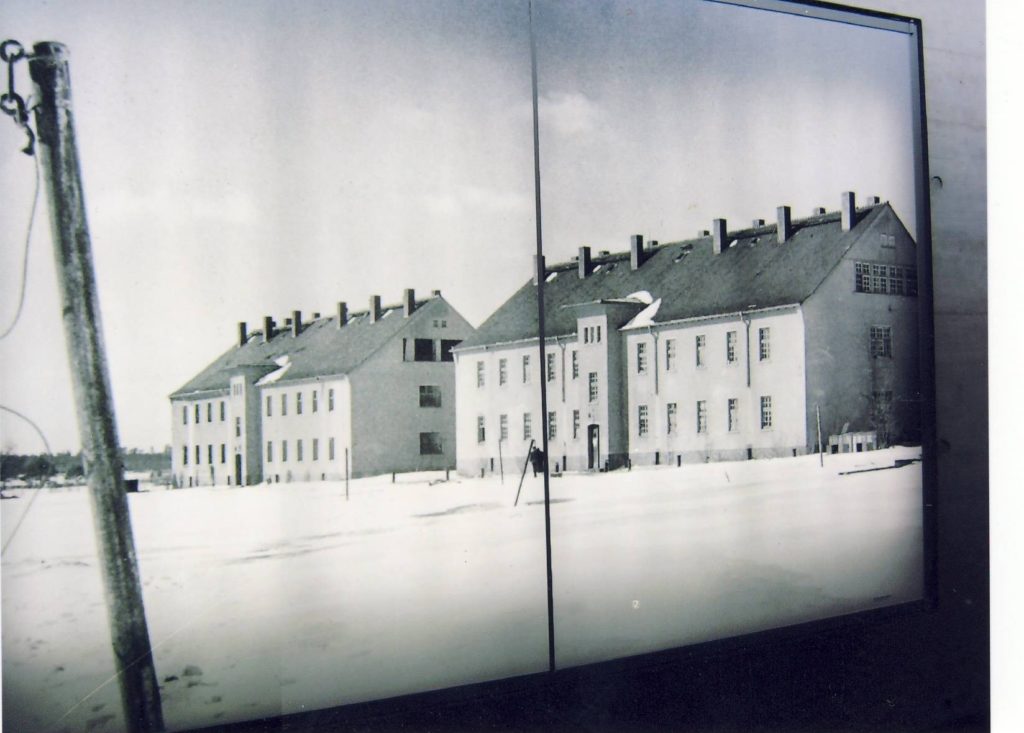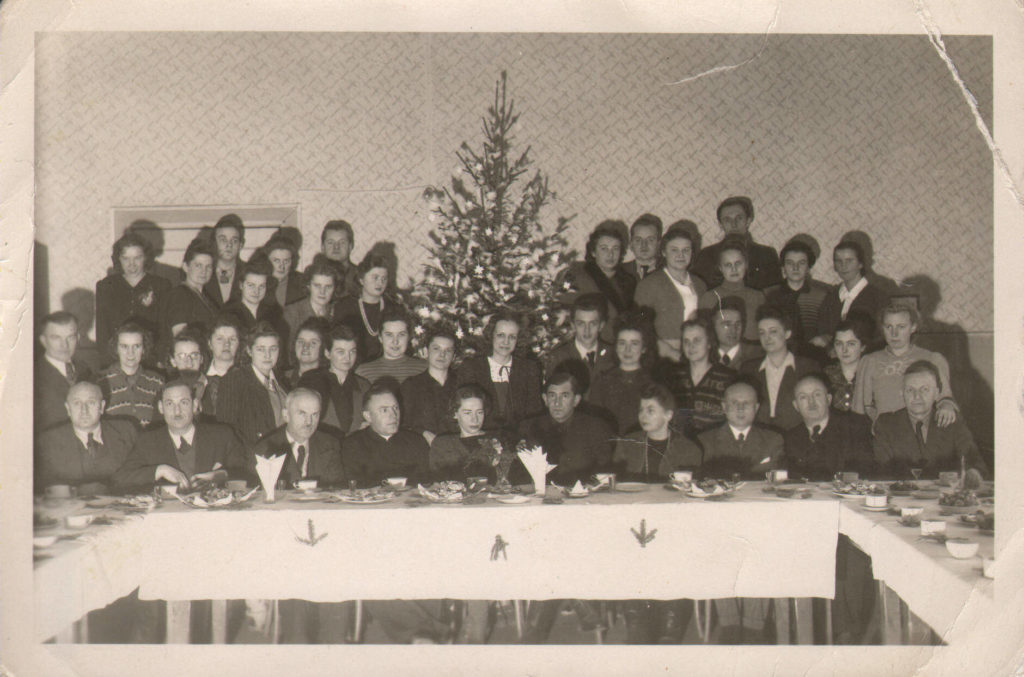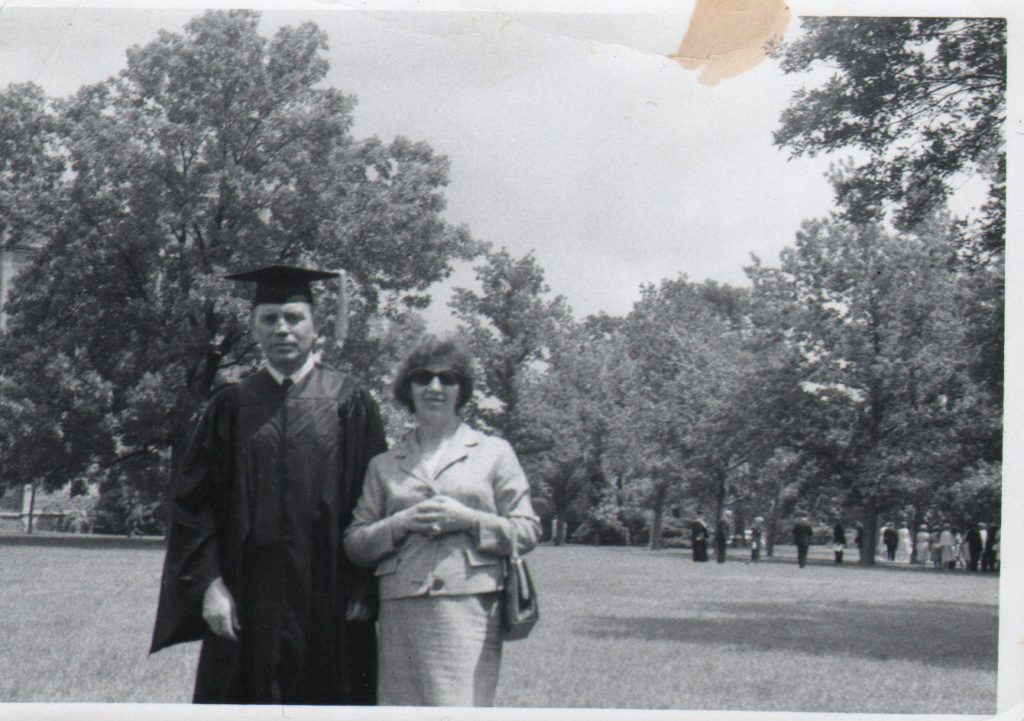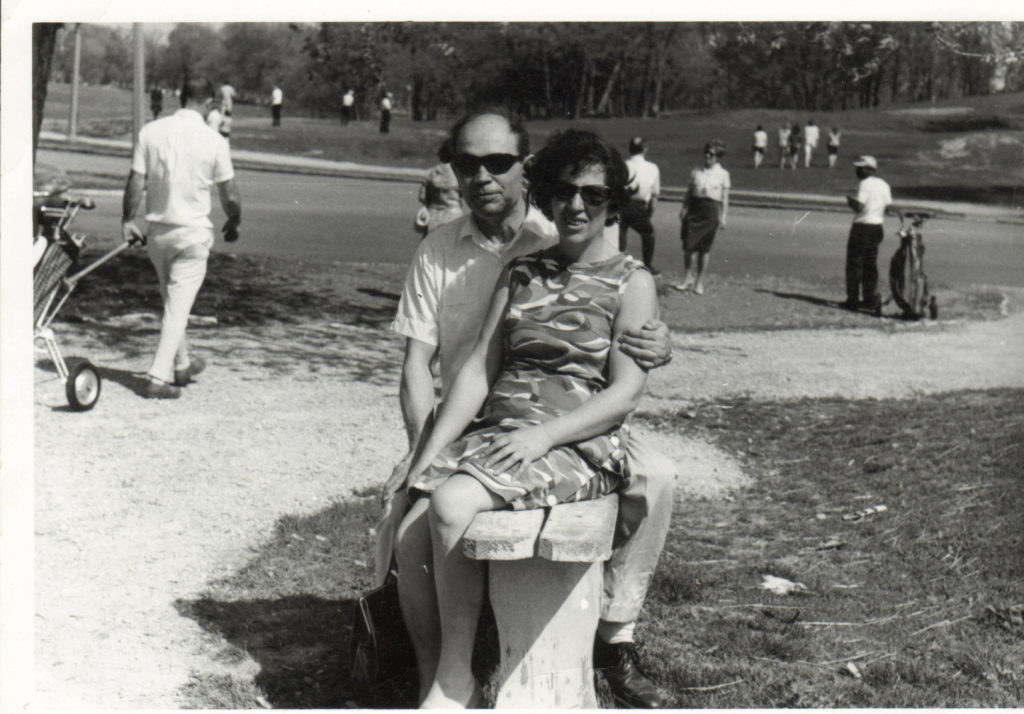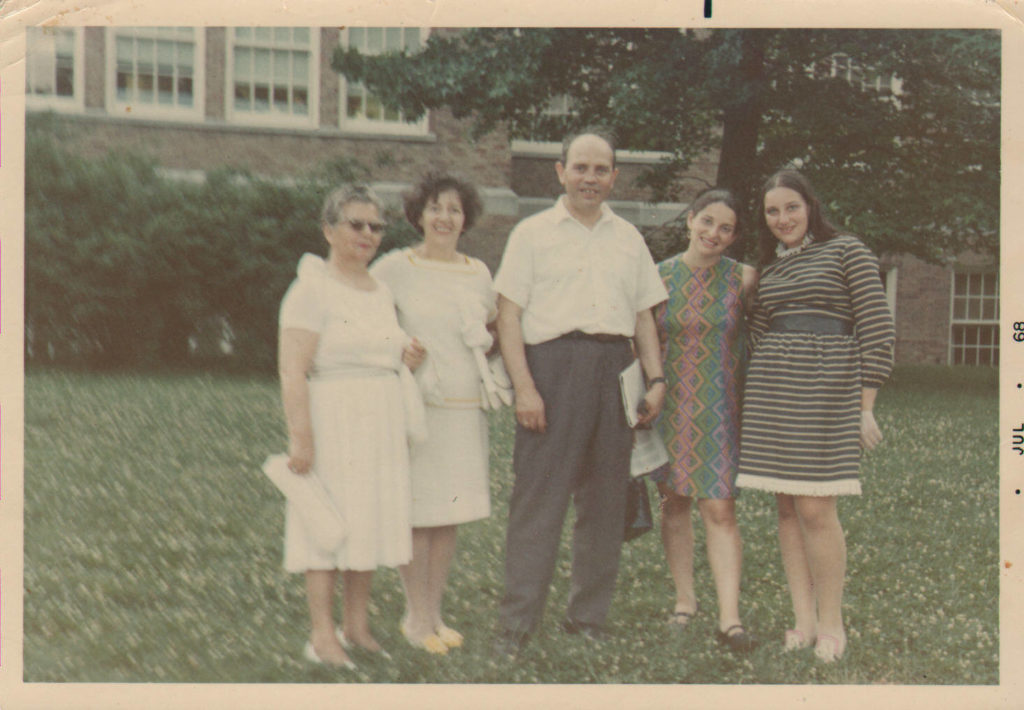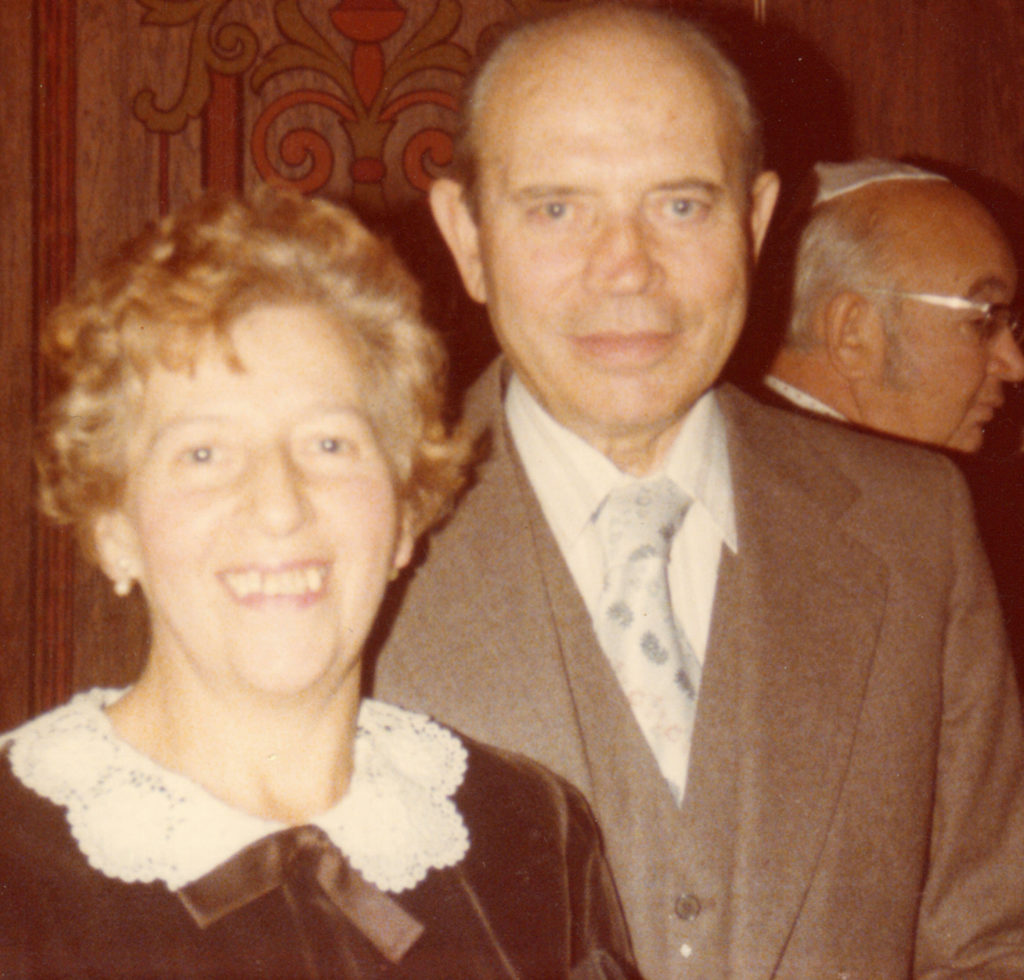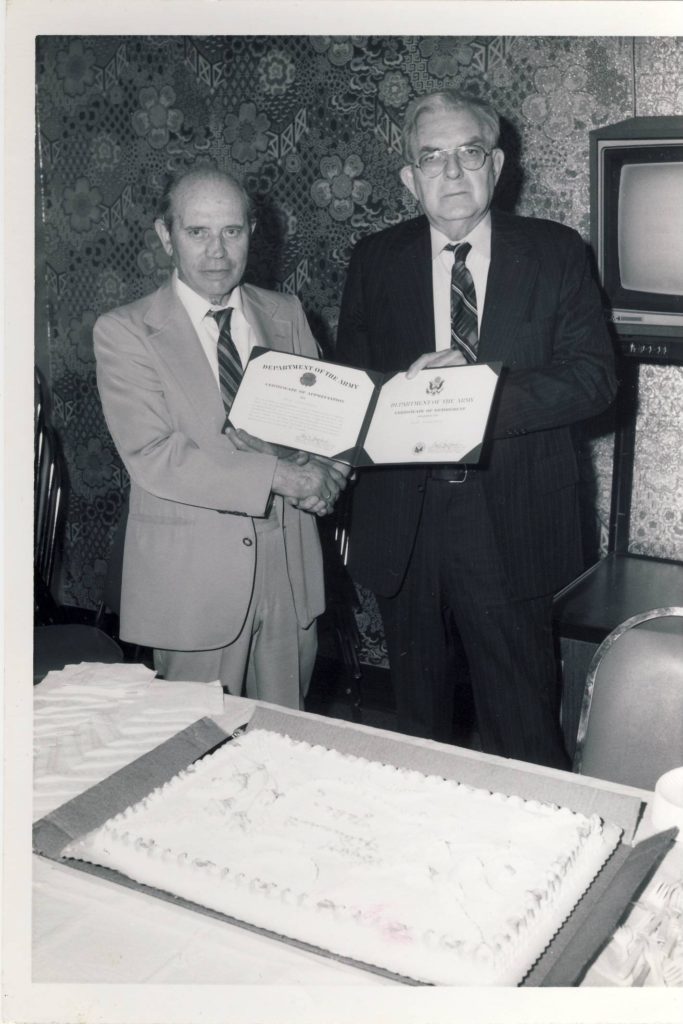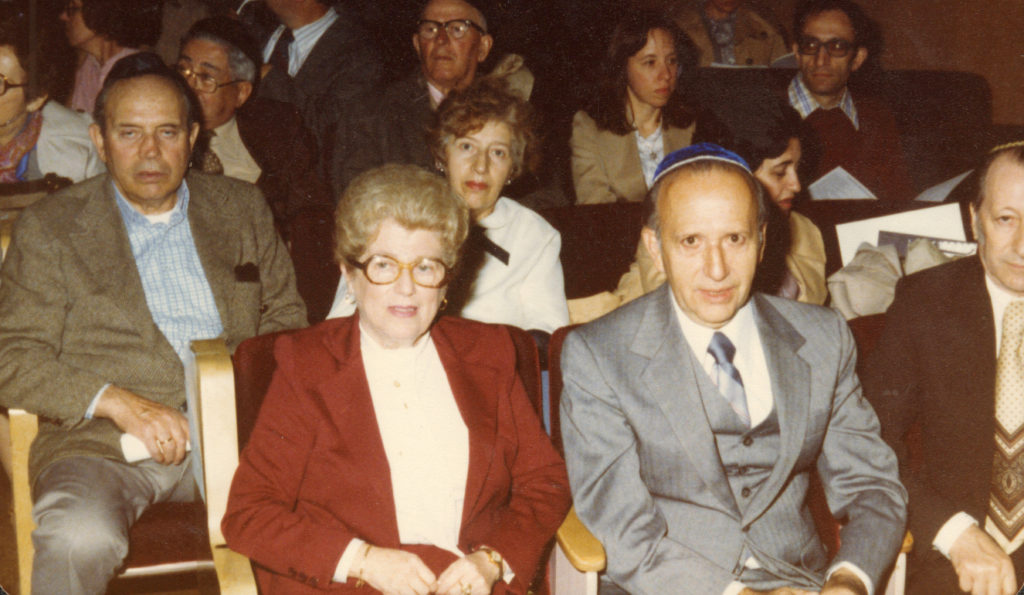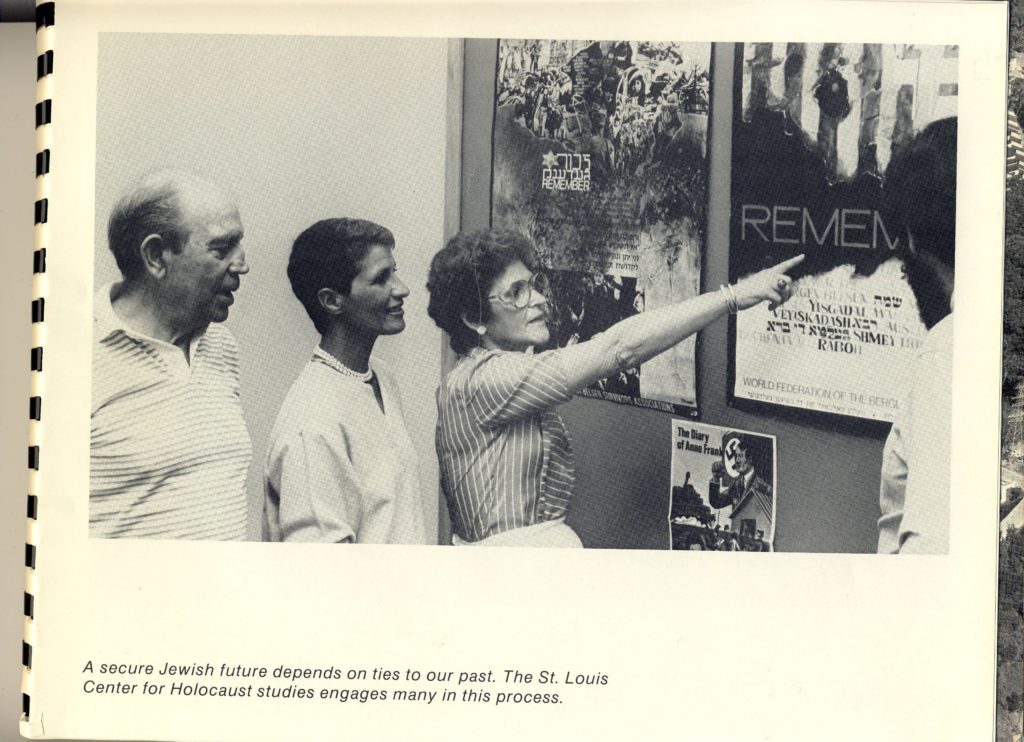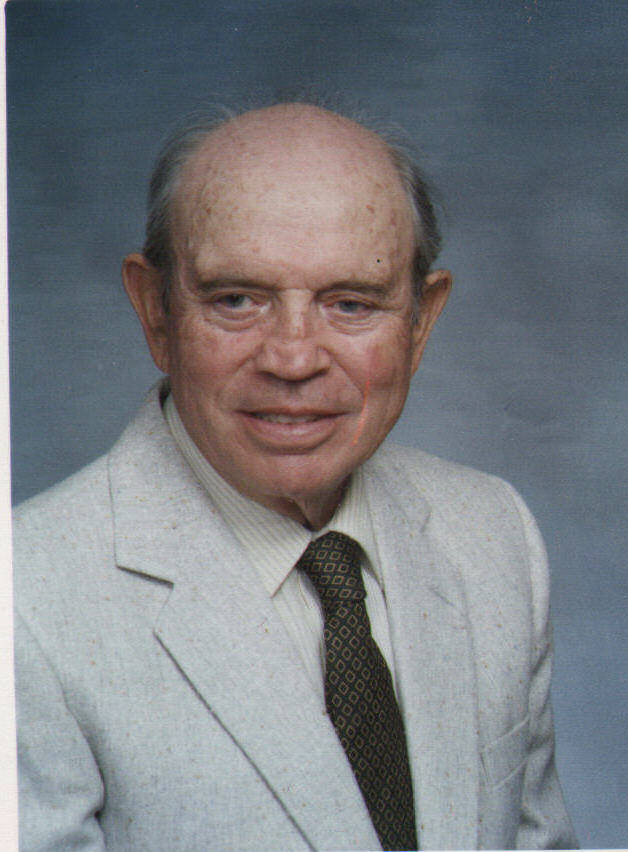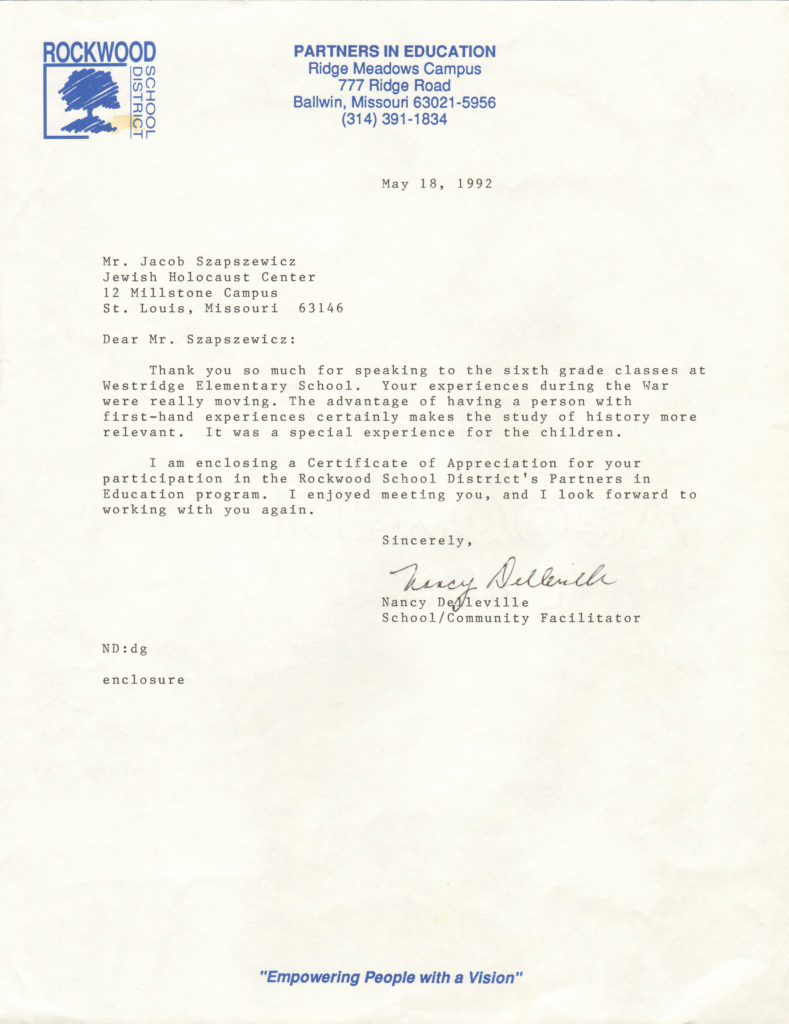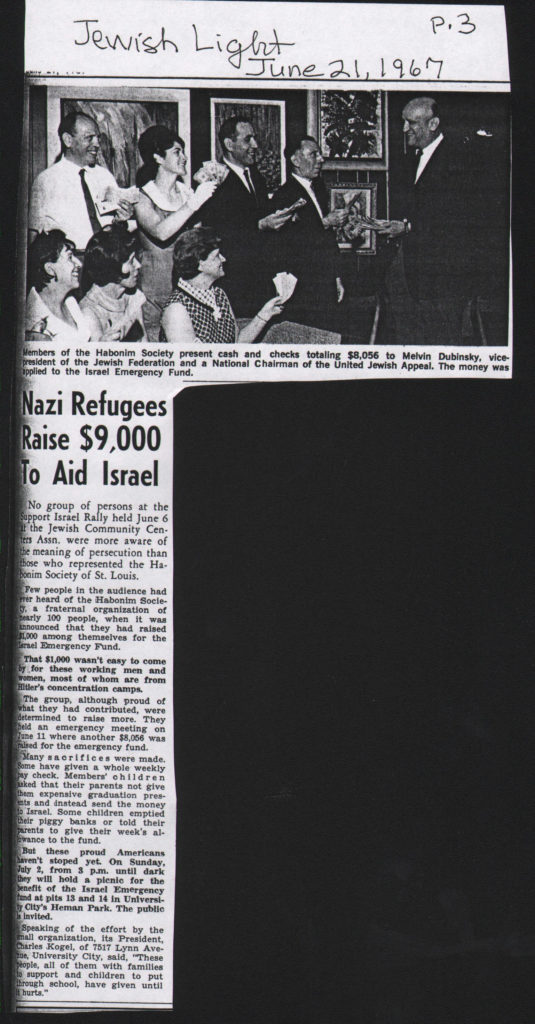As I told you, he always made some pressure on us. And there was a lot of things what he needed. Actually he needed everything. He didn’t have much. He needed coal and in our wanderings at night, I saw some coal. You know, those bricks made from coal dust…pressed. A lot of coal. In Poland usually people couldn’t buy only those bricks because better coal…and during the war, the Germans wouldn’t sell it for private market. So I said, “Okay, we’ll bring those coal bricks and let him have it.” Boy, we put those two sacks of those bricks and it was so heavy. And we carried so many miles and finally we brought this and left it. And in the morning, we were expecting a big breakfast because we always wanted to eat. We were always hungry. But he didn’t bring us breakfast! We were wondering what happened. And after a while he came and he said, “Oh, what you brought me?” and he threw this and imagine! This wasn’t…this wasn’t coal at all. It was bricks from an old chimney because those bricks from an old chimney…from inside…they get black from the dust. So I thought, “that’s coal.” It wasn’t coal. But anyway, after a while he said, “You know, it’s alright anyway because I need bricks.” And he was satisfied.
PRINCE: Jacob, did he have a family?
SZAPSZEWICZ: Yes. He had a wife and 6 children.
PRINCE: And did they all know you were there?
SZAPSZEWICZ: They all knew, they all knew that we are here, but the smaller children. They were ever so smart. They wouldn’t tell anybody that we are here.
PRINCE: So, he…he helped you?
SZAPSZEWICZ: He helped in some ways. But you see, he risk our life every day because going out…he could be caught and finally we been caught.
PRINCE: Okay.
SZAPSZEWICZ: By going this, we had to cross a highway.
PRINCE: Excuse me. I just wanted to ask you. Did you have enough food? Did he feed you decently?
SZAPSZEWICZ: No. Not enough, but still we could survive…more than we got in the camp, but still not enough. You can imagine how much we needed to eat at this time.
PRINCE: You talked about “lonesomeness” at one…
SZAPSZEWICZ: We’ll reach this too. Because in this time, I wasn’t lonesome, because I had another boy. But in going to several places, we had to cross the highway and I told him…”Look, by crossing the highway you have to be very careful…don’t rush…go slowly because you never knew…the cars are going…in a second they can see you. Don’t run away…just go slowly…they will move.” And so I crossed the highway first and hid behind a bush and he was crossing the highway (the other boy). When he was crossing, a car came and he started running because he stopped and run after him, and he couldn’t escape them. They took him in the car. When they took him in the cat, I was afraid. I didn’t know what to do because I knew they’re going to…going to beat him so he will tell where he’d been. And by telling, they’ll come and not only kill me, but kill this farmer too with his wife and the children.
PRINCE: Could you tell…were they Germans?
SZAPSZEWICZ: Sure, they’re Germans. There was no other cars but Germans. Only Germans could drive a car.
PRINCE: Was it Army?
SZAPSZEWICZ: It wasn’t Army. I am sure it wasn’t Army. They wouldn’t do it like this. But you know what they did? Later I found out, because this peasant told me that was seeing this. He said to put him in the car, they didn’t want him to go in the car. Maybe he smelled. Maybe he was dirty. So they put a chain on his neck and they bound him to the car. The car was driving slowly, but even driving slowly, he couldn’t make it. He fell and they didn’t see it. So he hit with the head on a stone and killed himself…instantly. This was a big, you see, a big shock for me…but on the other side…
PRINCE: He was like a brother to you?
SZAPSZEWICZ: Yes. But on the other side, it was big luck too that he was killed. If not, he would tell this story. No doubt of this because they start…they start beating you. Nobody can stand it. Everybody will say anything. Never believe that you can stand it. You have to tell what you know. And when I find out he was killed, believe me, it was anothershock. It was like, even worse, like my parents…like my brothers and sisters, because he was the only “one” with whom I could talk. Now, I walked around single at night…big sky with all those stars, and it was cold and I walked by myself and thought about, “Boy, what a situation am I. Worse than anybody, even a murderer, even worst murderer when he escapes from prison. He always has some place where he can think of, with his parents, or girlfriend or a cousin or a friend. There was no place in the world where I could go…where I could tell.”
When I walked around, I saw those old quarries, the stone quarries, with those holes always automatically, and I thought, “maybe here I can hide myself…maybe here.” Because I never knew how long I can stay with him because he told us, “If the German military came in the village, you have to go.” So, one time it happened. They came in this village…they came in this village, so he went to me, “Jake, you have to go.” So I went out, back of the barn…it was a winter day. It wasn’t very cold at this time, but there was like a lot of fog. The snow was melting. So I thought, mmm, luckily there’s fog. They won’t see me. But the sun came out later and the fog settled. I didn’t know where to go…where to go. You see, there was no place to go. I could walk at night. At night I felt in my surroundings because nobody could see me. But at daytime, it was the first time in, you couldn’t believe it…my eyes start hurting because I was used to walk at night. I could see everything at night. I could read very fine print at night but because I didn’t see any lights. Later people told me…how few people I could talk to at this time, because they were scared of me because my eyes were lightening, when a wolf, you see, someway developed the whole light on concentrating on my eyes. If you take a…let’s say a cat at night…I don’t know if you’ve watched a cat at night…when it’s dark. The cat’s eyes will light like some…some light inside. Was how few…how little light exist at night, he concentrates on those eyes. They have a specific way to do it…those animals…some animals.
You know, I was very eager to know what’s happened in the world. I knew it was D-Day and I knew the Allies landed in Normandy, but what happened? I couldn’t even ask a peasant…he didn’t know. So the Russians, they used to throw papers at night, after Stalingrad, when they caught so many Germans…so they…some Germans turned Communist and the cooperated with the Russians and they printed a German paper and they called this “Neuse Frevier Deutschland.” And in this big paper, they flew in the planes at night and let those papers go and they thought that the German soldiers, by reading those papers, maybe they’ll turn around and kill the Hitler people and become Communists. But the German soldiers didn’t believe in this. But like the Russians always do something is wrong.
PRINCE: The Russians always did something wrong?
SZAPSZEWICZ: Always dp something is wrong. They wanted…it was a good idea to print those papers, but how did they print them? I was studying German all my grades…in grammar school and highschool, but this German was in normal German…used in Germany. The letters were normal letters. The Latin letters like English, like Polish, the the Germans printed this paper in Gothic. I don’t know if you ever see Gothic.
PRINCE: Gothic?
SZAPSZEWICZ: Uh huh. Gothic letters were used in Germany in the middle ages and they are quite different than normal letters and I never knew how to read Gothic. But you see, I was so eager to know all those news so I learned…I taught myself how to read Gothic. And you wouldn’t believe it, but I could read it so fluent, like any German. It didn’t bother me anymore. I could read Gothic! And still what I read…it was by the light of the moon. And when you have to read fine print in Gothic, I can’t believe that I did, but I did. And I knew all the old politics…all the news…everything! I could sit down at night on a stone, let’s say, and reading the German paper in Gothic. Sometimes I was laughing to myself.
PRINCE: It was like a dream…
SZAPSZEWICZ: What I am doing here…reading Gothic (LAUGHTER). But that’s what it was. And boy, my loneliness was terrible. Now you see how lonely I was, because I was longing for friends. For somebody else with whom I could exchange…have some intercourse…talk to him…that’s all I wanted. And this wasn’t possible. I had, at daytime, I usually slept. At night I wandered around. Sometimes I came to my…to peasants, to farmers, I knew before then. I had to go sometimes to ask them for some help…for food…or for some clothes, but this man wouldn’t give me anything.
PRINCE: Could you ever bathe?
SZAPSZEWICZ: Pardon?
PRINCE: Could you ever bathe? Would they let you bathe and keep clean?
SZAPSZEWICZ: No. Bathe! Don’t think about it. There was no bathe. They didn’t have any…how could I? They didn’t do it either. You know they got…they went to the water in summertime. Maybe it was hot and that’s all. There was no bath…No…absolutely not…No.
PRINCE: That was the least…
SZAPSZEWICZ: Yeah. I didn’t think about it anyway. I got other problems. So even if I went to a house, sometimes, they wouldn’t keep me only a minute or two. They wanted to get rid of me, because they were scared too. And how many times I walked around and I saw houses and I saw a little light and I thought…”Oh, here’s a house and inside it’s warm and pleasant. People are sitting and maybe they’re sleeping in a good bed…a clean bed. And who am I? What am I doing? Will it work?” I really had some doubt that it would work. But as I told you, I build up some resistance and I said, “No…I have to survive.” At least I can tell people what I went through. And that’s the big reason that I’m ready to tell my story, because I promised myself that I’ll tell everybody. I thought if I am the only survivor, that’s what I thought, so I will be something! But it wasn’t this case. After the war, when we survived, nobody cared about us…absolutely…especially in Poland. You know what they wanted to do with us? They wanted to send us to the mines, to dig coals…the survivors. So I said, you see, it was different but still I believed that if I survived…I live through…I’ll be the happiest person. But later I thought, how could I be happy after the hell I went through. I got thoughts…someday I thought it would be alright. Someday I thought…”this won’t be.” It’s…so many years went through and this would be like everything would be “yesterday.”
And maybe, two months, I was alone. But finally when I came to one place, they told me, “You know, your friend Moshe is around.” I didn’t told you about Moshe…did I? Moshe was a Jewish boy. His family lived about a half a mile from us. We were rather wealthy people and they were poor. So, because wealthy Jews didn’t hink it’s nice to learn their children a trade…for some reason they thought to be a trademan is something not okay. You see, the social status went down. But Moshe came from a poor family. They didn’t think about personal status, so he learned a trade. When he was in my age…15, 16, he had some money because he worked in this little town. And I din’t have…
PRINCE: Interesting.
SZAPSZEWICZ: Yeah. And I didn’t have any. My dad used to give me very little money…not enough. So I decided, “Moshe, you know what? I’m going to teach you,” because he didn’t know how to speak Polish…”how to read…to write.” And believe me, I was a good teacher too. I taught him so well that at least I taught him to read and to write Polish…very, not bad, even today he does it. So he paid me a little money.
PRINCE: Is he here?
SZAPSZEWICZ: He’s not here, but he’s in Canada. He survived. So I heard that Moshe is here. Oh, I was so happy, at least. How can I find this Moshe? I couldn’t go to the police and ask his address (LAUGHTER). I couldn’t give him a call or something.
PRINCE: He was hiding somewhere?
SZAPSZEWICZ: He was hiding too, and how can two people find each other…to hide. But you see, I knew all the place and as I told you, our mill was built on a long valley and at the bottom of this valley was a stream. On the banks of the stream were rather swampy. Swampy. It wa difficult to cross. So the only crissubg was…there was a bridge built and our mill was there. But later the Germans put their guard, a sentry, a soldier was on the bridge, so this was absolutely impossible. He couldn’t go through the bridge. But I knew too, that in his wanderings, he has to cross the valley to be one place…on the other side. So I thought, “He must cross it, but at what place can he cross?” And I knew such a place, where the banks were a little high and the ground was rather dry. So the little, little stream in this place people put some wooden planks, and this was considered like a little bridge. It wasn’t very safe but he could cross it! So I thought, “If he will cross this valley, he has to do it in this way…at this place.” Then I came here. I knew he’s not going to cross in the daytime and he’s not going to cross it late at night. What for…late at night, everybody locks up their houses and wouldn’t let him in. It’ll have to be someplace at night…but early night. So I came all the time about 2 – 3…2 hours after sunset and I hid in this bushes and was waiting. And I was coming for maybe a week…no Moshe. And sometimes it was cold and a fine rain was falling. It was wet. I was sitting outside still. I felt it was about midnight that I dad to go back. And I almost gave up. And one time I saw, I didn’t see the man, I saw like a shadow, like something first because he was a night man too. And he could walk quiet…went through this little bridge, and I said, “That must be Moshe” and I started yelling…what did I yell…I was scared to yell Yiddish or Polish. I yelled, “Amcho.” Amcho in Hebrew means “Jew.” And we used to communicate in this way, and nobody could know what Amcho means. I yelled, “Amcho, Amcho.” He didn’t stop. So I ran after him and he ran too and I felt he was scared of me, sure. He didn’t know who am I. And I felt that I’m not going to catch him and I started yelling, “Moshe, Moshe” and he stopped.
PRINCE: Oh boy, he must have been…(LAUGHTER)
SZAPSZEWICZ: He stopped so finally I came and boy, you can imagine…and this Moshe was short. I don’t know if you heard such expressions “Spritzer.” He always, always, always overdid it a little when he talked with somebody. If somebody’s rich, he made him “Rothschild.” If somebody’s fat, he made him 500 pounds. Always more. (LAUGHTER) I knew him for a long time.
PRINCE: Exaggerated.
SZAPSZEWICZ: Exaggerated, yeah. So he said, “Jake, you know how happy you are you make me.” I said, “Why?” And he says, “From this time we’re going to have food, everything…even we’re going to eat chicken.” You know, chicken was considered one to the best. (LAUGHTER) And I said, “Why, Moshe?” And he says, “Don’t you know?” And he puts his hand in the pocket and I was sure he was going to pull out some gold coins because gold coins in this time…you could buy everything. But you know what he took out? He took out…he pulled out those pliers what you cut barbed wire with. And he said, “This.” And I said (LAUGHTER), “How come, what, what we going to have?” (LAUGHTER) Yeah, I just couldn’t answer him…and said, “What is this, he’s crazy or something,” for those pliers he’s going to have everything. He said, but finally I understood because he said, “Thanks to these pliers, he could cut the barbed wire.”
PRINCE: And get into the…
SZAPSZEWICZ: And escape from the camp which was already planned for extermination. And he escaped so he considered those pliers are so worthless? They’re, having these pliers, he’s safe and rich and everything.
PRINCE: Wait a minute. Back up…the pliers saved him?
SZAPSZEWICZ: Saved his life.
PRINCE: He’s already used them to escape from…
SZAPSZEWICZ: To escape from a camp. So he just developed up some sort of like a “fetish,” you know, like he believed like some people…something around the throat, here…neck.
PRINCE: Lucky charm?
SZAPSZEWICZ: Yeah, lucky charm. He going to war. He not going to be killed. So he believed in this. Alright. So I didn’t s’y anything. Anyway, it’s very interesting that this Moshe survived the war, together with me and later I lost him. And after a while I find out being here in America that he, he lives in Toronto.
PRINCE: Did you contact him?
SZAPSZEWICZ: Yes. And we wrote letters to us…to eachother. Finally he married and has a pretty daughter, and his daughter got married, and he invited us. I and Maria, we went to the wedding..You should see what kind, it was a beautiful wedding, and it was a beautiful, pretty girl too…very pretty.
PRINCE: Did he still have the pliers?
SZAPSZEWICZ: Wait a minute. Just don’t rush…(LAUGHTER), I’ll tell you.
PRINCE: (LAUGHTER)…I’m sorry.
SZAPSZEWICZ: And it was a beautiful…the girl was very pretty and educated. She’s an anchor in television…anchor girl in Toronto. Hew groom is a young lawyer. It was a pretty…it was a beautiful wedding and a big shul because in Toronto, Canada it is always in the shuls…special build for this. And there was special tables to sit down. So his wife happened to have a lot of sisters, I think 4 and 5, and 3 brothers. So they a big family, so those 5 sisters and the brother-in-law were sitting close, but not to this table. This table was Moshe, his wife, myself and Maria. So after…during the wedding something like a (LAUGHTER) fight develops…not a fight…they start talking. I heard those women and they say, “Why you took a stranger to your table and you didn’t put your wife’s sister?” Then Moshe said, “He’s not a stranger (PAUSES) he’s more than a brother because we went through.” “And you know, you don’t know anything, “ he said…”He will know what it is.” And he said, “I still carry this.” And he took out from his pocket the pliers and he says, “You see, what I got?”
PRINCE: Oh, oh…
SZAPSZEWICZ: And I just was smiling.
PRINCE: Well, maybe he was right.
SZAPSZEWICZ: And I thought, “Moshe is always Moshe. (LAUGHTER) He never changes.”
PRINCE: (LAUGHTER) He never changes. That’s really unbelieveable that you were born so close and…
SZAPSZEWICZ: Yeah, it’s unbelievable. But this is happened. And from this time on, we’ve been together…this Moshe. And, and, oh, it’s a long story. Anyway, probably the tape’ll go out shortly…no?
PRINCE: No.
SZAPSZEWICZ: As I told you before, we been together and it wasn’t so lonely now anymore. We talked all the time. Boy, if I think about what we talked. We discussed philosophy. We discussed a lot of things. And mostly what we talked how lucky we will be when we survive. We did believe because the Russians start their offensive and we knew they’re not going to stop…at least, I, from reading those Russians papers in Gothic German…I was a whole politician.
PRINCE: Run for office…(LAUGHTER)
SZAPSZEWICZ: Yeah. So one time I remember we went…I think this was, uh, New Year’s Eve, and we went to this mill of ours and those Russians were burning those bonfires and skating on the ice of this lake that belonged to us and singing. And I was laying with Moshe on the top of a hill and looking down. And I thought to myself, “Boy, look those Russians are dancing and skating on the lake what I used to do sometimes, and now I’m laying in this snow.” How the world changs. So I believe that the tables will turn around sometimes, and maybe we will be in the top like the wheel history turns around. We are the bottom. It’s possible to go up as long as you live, and everything can happen to you. Because I’ll never believe that I will be in such situation like I was there. I knew beggars, they are poor people, but such a poor man like I was at this time probably doesn’t exist. It was aout three years that I didn’t have a shirt. It was about a year and a half that I washed myself with a little soap.
PRINCE: You mean you had no shirt?
SZAPSZEWICZ: No.
PRINCE: Then you were just walking around bare?
SZAPSZEWICZ: No. I got some rags…some, some coat because it was cold. I wouldn’t survive to walk around without nothing! Oh, some nice woman even…she knew me, and her son went with me to school. So she was even crying. She says, “Oh poor Jake, what happened to you?” She gave me away her son’s coat. The coat…it was a very good coat. It was like a padded jacket and it was a Russian padded jacket. So even when I survived later, I still had this coat. We went to this little town, Szydlowiec, and I was sleeping there and at night a Russian soldiers came to control it. And they turned the light on me and said, “What you have? You have a Russian jacket…give it back to me.” And I said, “Look, it’s the only thing what I have. It’s cold.” And he said, “You’re giving the jacket or not?” If not, he going to kill you and he took the machine guns and I said, “Okay, get it.” He got more than he expected, at least, there’s a hundred thousand lice in this jacket. (LAUGHTER) He can have it. He didn’t expect this.
PRINCE: Jacob, was it unusual for the peasants not to turn you in?
SZAPSZEWICZ: The problem is…I could never believe the peasants, if they would turn me in or not. Because maybe three days before the Russians walked, came, I didn’t know about this…that in one family, there was a Jewish one, Russia, peasant family was a Jew. A man, a wife and two children hidden. And somebody turned them in. In maybe three days befire the Russians came…the Germans came…took them out, and shoots them and took away the Polish people too. So you could never knew what’s going to happen! Probably not everybody would turn you in, but I could never believe and I would never try to tell anybody where I was. So in this time, thanks to this prabably, I survived, because I never told anybody. They, they didn’t even ask me. Some did ask me, so I said, “I’m not anyplace…I’m just in a hole…one night in this hole…another night in this hole.”
PRINCE: You had to be very strong not to tell because you needed people to talk to.
SZAPSZEWICZ: Yes. Yes, you had to be. After a while you get so, you know, you became like a wild animal. By instinct you do it. Because I believe every creature has an instinct which works automatically. When you are in good situation like we are now, this instinct probably sleeps. It doesn’t exist completely. But when you are in such situation as I was, the instinct came to life. And I did a lot of things, you don’t know why, by instinct, and this saved my life.
For example – I’ll tell you this one time, I and Moshe, we were walking and one place and maybe half a mile, far away, we heard some dogs yelling and so on. And I didn’t know anything about…nobody told me…I didn’t see anything. I didn’t hear anything but something inside me told me…there is danger. And I said, “Moshe, let’s run back.” And we started running back and when we started running, we heard, “Halt, Halt” in German and they start shooting to us. You know there were hidden German soldiers in the bushes and we would come closer, they would caught us. And why did I turn back and start running back? I don’t know, I still wouldn’t know, but this is an instinct I believe…
PRINCE: Back to “trust” for a minute. I would like to ask you a question.
SZAPSZEWICZ: Yes.
PRINCE: Did you find it difficult to begin to trust people again?
SZAPSZEWICZ: It was very difficult. You see, it was a long time…you wouldn’t believe it. It took a long time before I adjusted myself to a new way of life. I’ll give you an example. For example, when the Russians came and it was already safe for me…the first thing what I wanted to get clean. It was very important to me…very, terrible. So I went to a lady I knew and we were friendly. Very nice lady and her husband was in business with us. And when she saw me…the first time she saw me…and she started crying and she told me her husband had been killed by the Germans too because it was intelligentsia. Usually the Germans killed the Polish intelligentsia too. And she said, “Oh, I know you probablyare dirty (she proposed to me) and she called…she got a maid and they started in…they didn’t have a bathroom, you know. It’s still a Polish village but they warmed a lot of water and brought it in a special little room…a big barrel…and put the water there and took all my clothes with forks, and burned EVERYTHING I got. It was unusable anymore and I was washing and washed myself and everything with soap and later she gave me all the clothes from her husband…clean and everything. Boy, I felt…
PRINCE: You must have felt…
SZAPSZEWICZ: I felt wonderful. But after, maybe, an hour or two, I felt…I realized I’m…I’m full with those…
PRINCE: Lice?
SZAPSZEWICZ: Lice again. Because, it may be difficult to talk about, but a matter of fact, they were sitting in my skin…in my flesh. And you couldn’t get rid of them.
PRINCE: How did you?
SZAPSZEWICZ: So I went to a doctor. A doctor I knew before and he was very happy seeing me and I told him what I wanted is some ointment or something. And he said, “You know Jake, today I don’t have it, but tomorrow I’m going to have…the Russians soldiers have a special powder which came from America. And this powder is called DDT.”
PRINCE: Oh, my.
SZAPSZEWICZ: He said, “Come tomorrow and we’ll get rid…you’ll get rid of this. You’ll never see this anymore.” And that’s what happened. Tomorrow I came and I undressed completely and he spread this…this is the first time what I heard about the Russian powder.
PRINCE: And it worked in one spray?
SZAPSZEWICZ: Oh, wonderful.
PRINCE: Oh.
SZAPSZEWICZ: You wouldn’t believe it. From this time you didn’t see anything. This kills everything. It kills the lice, and the eggs. More important…the eggs, everything!
PRINCE: Then you really felt clean?
SZAPSZEWICZ: And then I felt clean. I didn’t see more. That’s one thing, but let me go back to this lady. She invited me to come and she’ll make for me a big meal. So, really, I didn’t eat such things for years and when she went out to the kitchen, for, let’s see, to bring more tea or something, I remember this…I did this instinctively, I grabbed a piece of bread and I hid it in my pocket. You see, and later I thought what did I do? Why did I do it?
PRINCE: That’s very understandable.
SZAPSZEWICZ: It’s impossible. Probably it will never be a situation where I won’t have bread. But this was the situation, you see. I had to watch myself. I had to adjust myself.
PRINCE: Because you had to adjust yourself before.
SZAPSZEWICZ: Yeah. Yeah. Before I had to adjust myself to become what I became.
PRINCE: Which was easier, Jacob?
SZAPSZEWICZ: I think it was easier to adjust myself to be a thief than later to become back a person.
PRINCE: Yes. Yes.
SZAPSZEWICZ: You see, I always got some, inner, let’s see, force, like to become a shoplifter for example…to go in a store…this was in Poland…to go in a store and to grab something. Boy, I had to watch myself because my hand automatically went there…even without thinking. Would you believe this?
PRINCE: Yes. I would believe you. This could happen to anybody.
SZAPSZEWICZ: I believe that from a person, but there are some things what a person…not every person who go very low. I saw people that went so low…so low…that I didn’t see this, but I heard that people ate human flesh.
PRINCE: You did what you had to do though.
SZAPSZEWICZ: But I don’t believe that everybody can do it. There were things what I did, but not everything. I always had some…
PRINCE: Some reserve.
SZAPSZEWICZ: Some reverve and some…I always remembered that I’m a human being. Always. How low I went down.
PRINCE: But, but when You are forced into…
SZAPSZEWICZ: Even.
PRINCE: inhuman conditions.
SZAPSZEWICZ: Even. Because I’ll explain you one thing. There’s not everything he can do. After the war when I’ve been in a…in one place…a Russian soldier came. He wasn’t a soldier. He was an officer. And you see I didn’t speak Russian but if you speak Polish, you can always communicate with the Russians. You speak slowly. He will understand you and you can understand him. Anyway, I picked up some Russian words, and we could talk quite…quite easily, comfortable. So he told me, he said, “Jake,” they called me “Yasha” in Russian…my name is Yasha. He said, “Yasha, if this happened to you, if they did this to you, you can pay them back. Come on with me.” I didn’t know what he meant. So I went with him and behind the barn there were about twenty German soldiers, bound. And he gave me the machine gun…they called this a Petasha. He said, “Go ahead,” you know.
PRINCE: Called it what?
SZAPSZEWICZ: The machine guns…they called Petasha. It’s a Russian word. They have special machine guns. You see, in our army those hand machine guns that have this clip, and theirs is like a wheel around. And I knew how to shoot this. He said, “You know how to shoot this, go ahead, kill them.” And would you believe it, I couldn’t do it. I couldn’t do it…I tried. I couldn’t do it, I wqnted…I was mad and I couldn’t do it. So he said, “Ah, you’re not a man.” So he took the machine gun from me and killed them right away…without nothing.
PRINCE: You were the man.
SZAPSZEWICZ: You see, I couldn’t do it.
PRINCE: You were the human being.
SZAPSZEWICZ: I didn’t believe it myself…for this…what they did to me. I should be happy to do it. Now I’m happy I didn’t do it.
PRINCE: You maintained your dignity.
SZAPSZEWICZ: Yes. Yes. I didn’t do it because after all, they were soldiers. Because what I believe that those who organized those things, those killers, they mostly escaped. And the soldiers were rather innocent. There were many people like myself. They were drafted in the military and they went, and they…they suffered. And those who organized the whole thing, probably, they still live someplace in South America and have a lot of money. That always happens. If you punish, you punish the people who…who probably didn’t do the least. That’s always the way they do it. So, I’m happy I didn’t do it.
Let me now tell you. We’re talking about all the time on this war and how I was hiding. And so finally, and as you know, and I will never forget the date…it’s January 13, 1945…the Russians came! It wasn’t that simple too. It was big fighting about 40 miles east of us. And the Russians broke through and the Germans started running. They were running with the Russians after them. And it was very cold. It was about 25 or 30 degrees below zero, Centigrade. I can figure out how much this is Fahrenheit, but you can imagine how much is it. It’s about, you know, when in lower grades, I remember still from physics, we had questions and one Professor asked us,”What is a degree?” No, a…yes, “What is it when Fahrenheit and Centigrade are equal?” And it exists, such things. You can figure out by algebraic equation. And we came out as 40 degrees below zero. When it’s 40 below…Centigrade and Fahrenheit are the same. Then when it was 30 below zero in Centigrade, it was about 32, 33 Fahrenheit below zero. You can imagine how cold it was! And the Germans are not used to such temperatures and the Russians are. So when they had to run away, they were…they were…they were in bad situation and bad shape. And the Russians killed them mostly like vermin. No, I didn’t mind it. You see, at this time, I was rather…I thought that that’s the way what they have to do it. Either they have to get it for what they did to us and the Russians told us too that the Germans killed too about 20 million Russians. So they paid them back. I think they paid them with the same way they paid other people. It was a silly situation because a war should, even if a war exists, there should be a war, but not exterminations of private people who never did anything. But that’s the reason we never believe that such a situation can happen. Because my parents always told me when the war broke out, “You children, you don’t have to be worrying about, because we remember om 1914, in 1916 when the Germans came, they behaved…they were better than the Cossaks. So there’s nothing to be afraid.” If we would know what’s going to happen…probably was a chance to escape to Russia…probably would do it. But we didn’t know, and later it was too late. We were surrounded and there was no place to go.
So January 13, I remember being in this barn and looking out and we saw a German tank moving through the fields, and he was pulling something behind and down came a Russian plane with a rocket and so…and anyway, the tank exploded and we saw the soldiers running out and then the plane came again with a machine gun and killed them all. And it was gone. And the tank left…like a trailer from behind. And this peasant says, “Let’s go and see what they have.” And he ran first and he came back and he’s got a load of shoes…in the trailer…he found shoes…soldier’s shoes. There were so many, maybe 50 pair, he brought. So I told him, “Look, I don’t have…I’m pratically barefoot. I have wooden shoes, I can’t walk, give me one pair.” And he didn’t want to give me. I said, “Alright, I’ll go and get myself.” So I went there and opened this trailer and I saw some flames coming out from the tank, but anyway, I found a pair of shoes. Okay, as I told you those shoes came very handy to me because at least I could walk and going back I was lucky because I hit a stone and fell and this moment the tank exploded! If I wouldn’t fall and lay down, probably it would have killed me anyway. So I survived again (LAUGHTER) and came back and you know, it started another story because this was only the beginning. We had to go to find some other people…to get free…to adjust ourselves, and so on and so on…until the normal life started. It was a long story, but probably we’ll talk about that at another time. Thank you.


